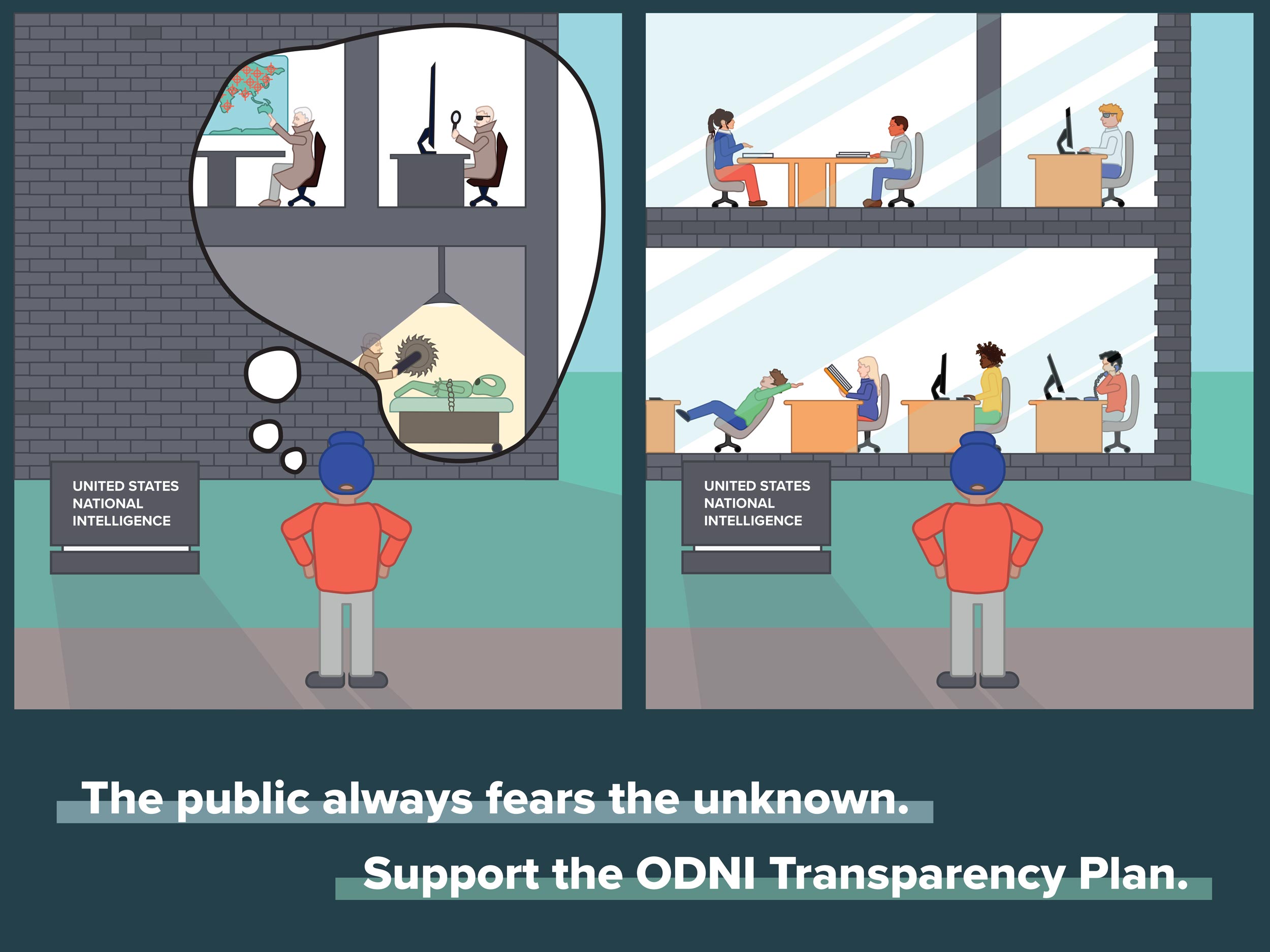ODNI Virtual Interns Make a Difference While Learning about the IC
Internships, along with currency, assistants, and even classrooms, have gone virtual. The State Department-sponsored Virtual Student Federal Service (VSFS) program is an eight-month “eInternship” for U.S. college students who want to learn more about the federal government, including the Intelligence Community.
The ODNI participated in VSFS for the first time in the 2017-18 academic year, engaging 21 interns who supported three different groups on a variety of unclassified projects, including some aimed at promoting a new IC-wide transparency initiative. The projects drew on interns’ skills in research, writing, video production, and graphic design.
VSFS interns can complete their work from anywhere in the world, as long as they have a reliable broadband Internet connection. Hannah, a junior majoring in liberal studies at the University of Notre Dame, was able to participate in the ODNI cohort while studying abroad in London. She created a video explaining the benefits of transparency in the IC and worked on other individual and group research projects. She says her experience with the VSFS program at ODNI “has been enjoyable and enlightening” and showed her “just how vast the Community is.”
Several of her fellow interns shared similar sentiments, including Nick, a senior majoring in national security studies at the University of New Haven, who agreed that his internship experience was “eye-opening,” showing him that the real IC operates very differently from the way it is portrayed by Hollywood.
The VSFS program benefitted the ODNI just as much as it did the students. The VSFS interns brought a fresh perspective and new ideas to every task, as well as an eagerness to learn and get involved.

Interns created this poster, playing on myths that the IC is secretly holding aliens, to promote ODNI's new transparency efforts.
“I found the interns’ work to be very valuable,” said Jill Savin, of the ODNI’s Office of Civil Liberties, Privacy, and Transparency, who managed the CLPT interns. “They were motivated and, thanks to computers and smart phones, it was easy to communicate with them electronically. Several small projects had a short turnaround time and they had no problem working together virtually and completing projects quickly.”
CLPT’s Deputy Transparency Officer Michael Thomas, who also worked closely with the interns, said, “It was a delight to work with this group of talented young people over the course of their academic term. Their feedback was important to projects like the new Intelligence.gov.”
Indeed, the interns’ products will be used in internal communications with IC employees to help raise awareness of Intelligence.gov as well as to promote ODNI’s new transparency initiative. Other interns researched and wrote country profiles of several African nations that will be used in crisis management and wrote water and trade security research papers focused on South Asia. Involving the interns in substantive projects was particularly important to Thomas, who observed, “The nature of our work in the Intelligence Community means that it is hard to share with others. In particular, the security clearance requirements for our physical spaces can be daunting. The virtual intern program provides an opportunity to work with students from all over the country, to give them a sense of how we operate and to contribute to our national security mission, no matter what their field of study.”
The interns spent around 10 hours a week on their projects from September to May, working on their own schedules. Flexibility is one of the primary benefits of the VSFS program. Through their work, they not only learned about the IC but also gained critical skills for the workplace—such as how to work to short deadlines, frame issues and information in a reader-friendly way for the public, and work with a team—that will help them be successful in their future careers.
“[This experience] made me more secure in my career aspirations of working for the IC.”
Indeed, all the interns say their experience working at ODNI as part of the VSFS program has cemented their desire to join the IC after graduation. Janani, a junior studying political science at the University of California, says she is now “keener than ever to work in government and public service,” while Laura, a senior studying political science and business management at Southern Methodist University, calls VSFS “a really great learning experience [that has] made me more secure in my career aspirations of working for the IC.”
The program had some side benefits too: creating connections with potential future colleagues. Hannah, from Notre Dame, stays in touch with one of her project teammates via email. Although they live thousands of miles apart, they are hoping to meet in-person someday. If both of them pursue their aspirations of working for the IC after graduation, these virtual intern friends could end up working together in the IC for the security of the United States.
Nick, from the University of New Haven, sums up his intern experience: “If you can make a difference, even if it’s in a small role like this, that pushed me even more.”
VSFS accepts project submissions from government agencies in May and early June each year, after which students can apply to work on specific projects. ODNI plans to participate again in the 2018-2019 school year. Visit the VSFS website to learn more.
For more information on student opportunities within the IC, visit our Students page.